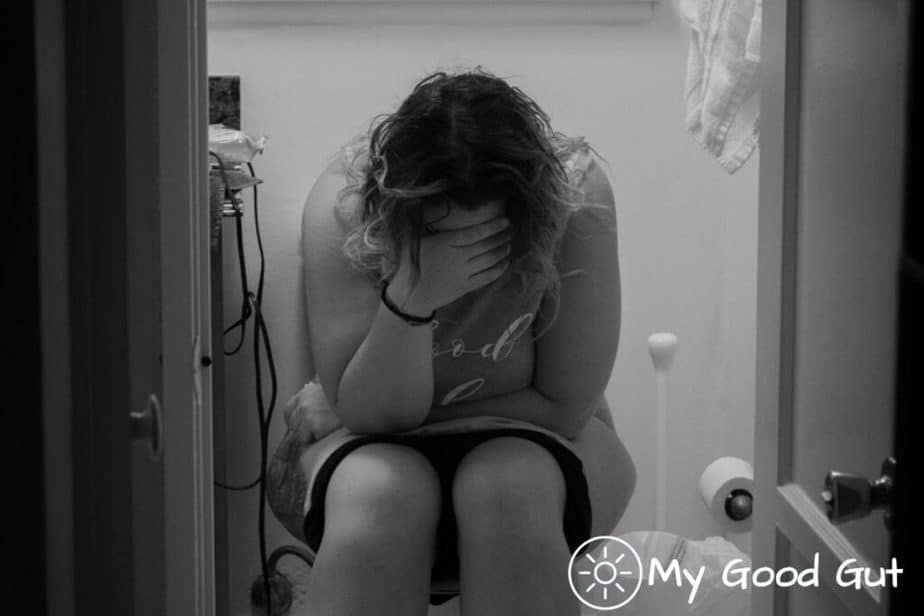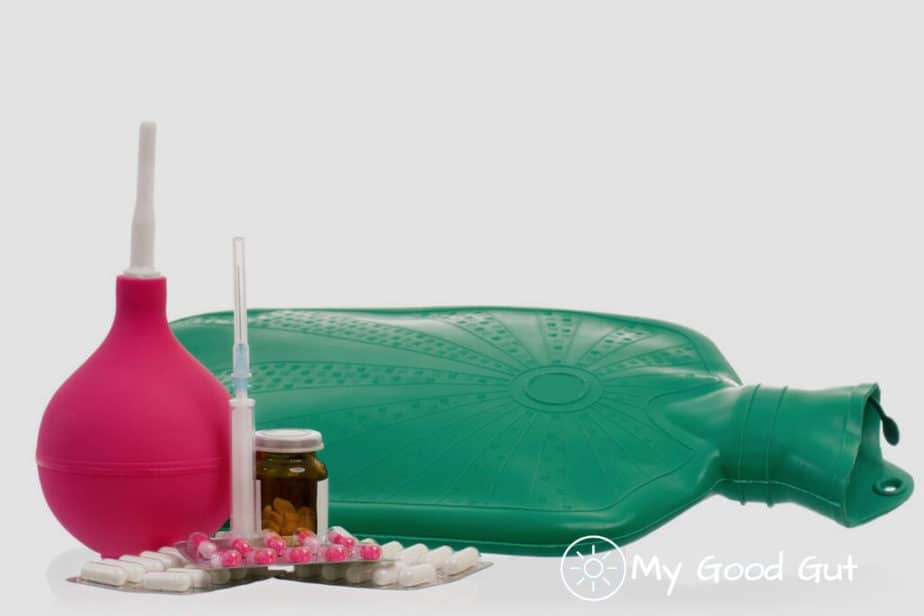Struggling with constipation and the discomfort it brings is not fun. One common issue that arises is when bowel movements become too large to pass comfortably or even at all. This can be a distressing situation for anyone experiencing it, but there are steps you can take to alleviate this discomfort.
When fecal matter builds up in the colon, it becomes harder and drier, making it more difficult to pass through the rectum. The result is often painful straining during bowel movements that may cause tears in the anal canal leading to bleeding and other complications.
It’s important not to ignore this problem as it can lead to long-term issues such as hemorrhoids, anal fissures, and even bowel obstruction.
Struggling to poop when it’s too big or really hurts is something we could do without in our lives! But what can we do when this happens?
Getting the stool a little bit out and not finishing the job is incredibly frustrating and can be very upsetting or uncomfortable.
This article will look at what you can do when your poop is too big to come out and it hurts, and even bleeds. We’ll take a look at the potential reasons for this and explore some effective measures that can help people manage their oversized stool while maintaining good gut health.

Why Won’t My Poop Just Come Out?
Stool being stuck midway out of your anal canal can be caused by a variety of reasons. Some of the most common reasons are:
1. Constipation
Failing to naturally pass at least 3 bowel movements in a week or being unable to properly evacuate can be defined as constipation.
Normally, you’ll notice that you’re straining, your poop is very hard or that you feel you haven’t fully evacuated after your toilet visit.
Chronic constipation occurs when this happens frequently or all the time. Normally, your doctor will be able to suggest some medications for this – the same applies if you’re having infrequent constipation and just need some help on an as needed basis.
Serious issues arise when constipation is caused by an internal blockage. This is because the blockage might be caused by something serious such as cancer or a twisted intestine.
In these cases, the passage of stool and gas could cease and abdominal pain or distension could develop. If a blockage is not complete, there may be a change in stool caliber.
Constipation will mean that your stool isn’t being moved at its usual pace through the body, and therefore is likely to be stuck due to its abnormal size and hard or dry texture.
Recognizing symptoms of oversized stool is crucial in preventing further complications from constipation. These symptoms may include bloating, abdominal pain or cramps, feeling full even after having a small meal or loss of appetite.
In some cases anal fissures (tears) may occur due to over-straining during bowel movement which could lead to bleeding and infection if not treated promptly.
2. Impacted Stool
Fecal impaction is normally a result of long term constipation and normally results in very hard and dry poop that collects in the rectum.
It can be extremely serious and in some rare cases, can be life threatening if it leads to obstruction of the function of colon or rectal ulceration and bleeding. The symptoms of fecal impaction can include abdominal pain, blood in the stool and painful bloating.
3. Medical Conditions
There can be various pre-existing medical conditions that can lead to painful pooping. These can include:
- Crohn’s Disease or ulcerative colitis: Inflammatory bowel diseases that can alter your normal bowel movements
- Irritable Bowel Syndrome: IBS is a gastrointestinal condition that manifests itself through intestinal symptoms that can be mild to severe, including constipation as one subtype
- Parkinson’s Disease and other neurodegenerative diseases: Neurological conditions. One early sign of this is constipation.
- Hypothyroidism: A thyroid condition. Your thyroid will regulate how your body can use its level of energy (taken in from foods and fluids). One sign of hypothyroidism is constipation, but in most cases other symptoms like fatigue or cold intolerance are also present.
- Nerve injury: Nerves within the digestive tract may not be working correctly, preventing the natural movements of the bowels. This can occur due to prior surgeries.
- Hirschsprung’s Disease: A condition that prevents normal bowel movements and causes poop to get stuck due to a congenital abnormality in the anorectal nerve supply.
- Medications: All medications can have potential complications, and constipation is a common side effect. This can occur with medications that are used to treat anxiety and depression, seizures and even high blood pressure.
4. Poor Lifestyle And Diet
Lack of regular exercise and a poor diet with low fiber can all contribute to not pooping properly. The lack of enough water can also do this as it can lead to harder poops due to water being reabsorbed from the colon and drying out stool.
Prevention is key in avoiding constipation. A diet rich in fruits, vegetables, whole grains, and plenty of fluids can help promote regular bowel movements. Exercise is also essential for maintaining proper gut health; even simple activities like brisk walking or yoga can stimulate digestion.
It’s important to avoid certain foods that are known to cause constipation such as processed foods, dairy products, red meat, caffeine and alcohol.
I’m Pregnant And Cannot Poop – Why?
Typically, this can be a result of hormonal changes that occur with pregnancy. There could also be lifestyle choices that affect your bowel habits too.
If you eat poorly and lack adequate water intake, this could make constipation worse. Fluid requirements increase in pregnancy. Typical first trimester nausea and vomiting can also make fluid and fiber intake difficult.
How to Have Smoother Bowel Movements?
To manage constipation effectively, here are four things you should know:
- Recognize the warning signs of oversize stool.
- Understand what causes constipation and how it leads to fecal impaction.
- Be aware of potential complications if left untreated.
- Seek advice from an experienced gastroenterologist for proper diagnosis and treatment options.
It is crucial to recognize these signs early on so that proper treatment can be administered immediately.
Understanding these factors will guide us in managing our constipation through home remedies without resorting to medication interventions.
There are plenty of things to try before the need to panic. Some early treatments you could try include:
Lifestyle Changes
Simply getting a good diet high in fiber, plenty of water and some exercise into your daily routine can get the body’s natural movements working as it should.
Along with helping your body shift the stool, exercise can promote increased water intake (preventing hard/dry stools) and will overall boost your body’s health and your mental health!
Your diet should be rich in fiber to help your healthy poop. Try eating fruits and vegetables along with whole grains.
Consult with your doctor first and always check the labels on foods.
Home Remedies
If your bowel problems aren’t an immediate medical emergency, you could try drinking green tea or taking probiotic supplements. The efficacy of these is debated though, so be cautious.
Another effective way to manage constipation is by practicing yoga poses that stimulate bowel movement. Poses such as Pavanmuktasana (wind-relieving pose) or Paschimottanasana (seated forward bend) help in relieving gas and bloating while also promoting digestion.
These poses can aid in softening the stool, making it easier to pass through the rectum without causing much discomfort.
In addition to yoga, dietary changes may also contribute towards easing constipation. Consuming foods rich in fiber such as fruits, vegetables, nuts, seeds, and whole grains helps regulate bowel movements by adding bulk to the stool.
Drinking plenty of water throughout the day keeps you hydrated and assists in breaking down food particles in your gut.
Using warm compresses on the abdomen may also help relax the muscles and promote bowel movements.
Making these small lifestyle adjustments could bring about significant improvements but if symptoms persist despite trying all home remedies- seeking professional advice is crucial for optimal management.
Over The Counter Medications
It’s important to note that constipation can sometimes take several days to improve.
Having said that, some over the counter medications you can try include:
- Suppositories: Medication that is inserted into the rectum that helps stimulate bowel contractions. Learn more in this article – How Do Suppositories Work for Constipation?
- Oral Laxatives and stool softeners: Medications that can soften the stool, increase the stool’s water content or lubricate the stool to assist in the expulsion. Some laxatives can stimulate bowel contractions but can cause cramping and urgency.
- Enema: An introduction of water or medication into the rectum which can lead to a more immediate expulsion of stool.
You’ll need to seek advice before taking any of these medications. Incorrect use or dosage can worsen the symptoms of your constipation.

Seeking Medical Help And Professional Advice
If you’ve failed with over-the-counter medications and fiber, your doctor may recommend a prescription medication to help with constipation.
Some of these increase fluid content within the bowel to help soften stool and speed it along. Other medications stimulate bowel motility.
When faced with difficulty passing stools, it is important to seek medical attention as soon as possible. Medical intervention may be necessary in situations where the stool is too large and painful to pass on its own.
There are several procedures that a gastroenterologist can perform, such as manual disimpaction or rectal irrigation, which can help relieve the discomfort associated with constipation.
In some cases, your doctor may recommend imaging like an x-ray or CT scan to assess how much stool is in the colon, look for an obstruction or a fecal impaction.
A colonoscopy may also be needed, especially in cases of new onset constipation, associated anemia or rectal bleeding.
What NOT To Do
There are a few things you absolutely should not do when you can’t poop properly. Doing any of the following can cause further problems:
Forcing The Poop Out
You might think it will help to push harder, but it doesn’t. It’s likely to cause problems like hemorrhoids, anal bleeding, extreme pain or fissures of the anus.
Using Your Fingers Or Objects To Get The Poop Out
You can damage the tissue if your rectum and anal canal when introducing a foreign object into it. Only a trained professional should be manually disimpacting stool.
In some cases, having to apply pressure to your pelvic floor (around your vagina or anus) can be a sign of pelvic floor dysfunction or dyssynergic defecation. Speak with your doctor about this as additional testing may be needed.
Drinking Alcohol
The dehydrating effect from alcohol can make your poop harder and worsen constipation.
Eating A Huge Meal
Your body might not even let you, but it is unwise to eat a huge (particularly unhealthy) meal. Some people add too much fiber instantly to their diet in an effort to relieve their bowel issues.
The fact is, you should slowly introduce fiber to avoid further problems like bloating and trapped gas.
Avoiding The Toilet
Sometimes, the pain can make people think twice about going to the toilet. However, it’s better to stick to a routine – even if you think you “can’t go.”
Your body requires relaxation and this can take a little while. Avoid the urge to push and strain right away, and just try to let it happen naturally.
Chronic stool withholding (getting the urge but avoiding a trip to the bathroom due to lack of convenience or time) can lead to chronic constipation.
It’s important to listen to your body and go when you get the urge.
When To Seek Medical Advice
If you’ve sought any basic advice, tried home remedies and lifestyle changes and have had no change to your bowel movements in 3 days – speak with your doctor.
If you’re in severe pain, notice blood or develop nausea and vomiting, you will also need to get in contact with your physician immediately.
As always, changing your lifestyle will require a medical consultation before doing so.
Potential Complications Of Stuck Poop
There are some surprising risks of having poop stuck. These can include:
- Lower blood pressure
- High heart rate
- Infections
- Lightheadedness
- Ulceration of the bowel
- Hemorrhoids
- Anal fissure
Prevention
Maintaining a healthy lifestyle with plenty of exercise, a high fiber diet and plenty of water is the best way to keep your bowel movements regular.
Regular bowel movements should prevent painful stool and allow you to poop before it’s too big.
Can I Do Anything For The Pain?
Taking acetaminophen (Tylenol) can help with generalized pain.
If you’re having abdominal cramps or spasms, peppermint oil capsules like IBGard or Pepogest may help.
For anal pain, topical lidocaine can help with pain related to fissures and hemorrhoids. One common brand we recommend is Recticare.
You’d be better off sticking to a healthy lifestyle and seeing your doctor as soon as you possibly can. A doctor may be able to prescribe medication to help with pain and more regular bowel movements.
Stool is Too Big Final Thoughts
The key points you should know are that when stool is too big to come out and it hurts, it can be really upsetting but is generally not a medical emergency.
However, inaction to help the problem can lead to serious complications and the constipation itself can be a sign of something more serious.
It is wise to try and follow a healthy routine. Keep a food diary to see if any foods are worsening your constipation and try to maintain a regular exercise schedule.
However, the problem is likely to return in your lifetime – the prevention steps can make the frequency of it low.
The most important of all the points is that you should consult with a medical specialist if you’re having severe pain or getting nowhere with the home remedies and over the counter medications.
Never try to solve the problem “manually” as it can cause further pain or discomfort.
Problems pooping can be embarrassing to talk about, but help is out there. It’s always better to tell your doctor.
Read more about other stool issues here:
Poop is Too Big FAQs
Can Eating Spicy Foods Cause Constipation And Oversized Stool?
Spicy foods can cause constipation and oversized stool due to the capsaicin they contain. Capsaicin irritates the lining of the intestines, causing them to contract and slow down bowel movements.
However, there are several spicy food alternatives that do not contain capsaicin, such as ginger or cumin, which can help stimulate digestion and relieve constipation.
Additionally, natural remedies like drinking plenty of water, eating fiber-rich foods, or taking probiotics can also aid in regular bowel movements.
By incorporating these alternatives and remedies into your diet, you can maintain optimal gut health and regain control over your bodily functions.
How Long Can Constipation Last Before Seeking Medical Help?
While it’s normal to experience occasional constipation, if the condition persists for more than two weeks, natural remedies and lifestyle changes may be necessary. These include increasing fiber intake, drinking plenty of water, exercising regularly, and avoiding processed foods.
However, when symptoms persist despite these efforts or are accompanied by other concerning signs such as blood in the stool or severe abdominal pain, it’s time to seek medical help.
Potential complications from untreated chronic constipation includes anal fissures, hemorrhoids, rectal prolapse and fecal impaction which could require surgical intervention.
Individuals who have been experiencing chronic constipation should consult a healthcare provider for a proper diagnosis and treatment plan.
Is It Normal To Experience Bleeding During Bowel Movements When Constipated?
Bleeding during bowel movements is a common occurrence among individuals who suffer from constipation.
This can be due to the increased pressure exerted on the rectal area when attempting to pass hardened stool, resulting in small tears or fissures.
To alleviate this, dietary adjustments and adequate hydration levels are crucial as they help soften the stool and enable easy passage through the colon.
Incorporate fiber-rich foods like fruits, vegetables, whole grains, and legumes into your diet while avoiding processed foods that lack essential nutrients.
Additionally, drinking enough water throughout the day promotes digestive health by keeping stools soft and preventing dehydration-induced constipation.
By adopting these measures, you take control of your bowel movements and prevent complications such as bleeding during defecation effectively.
Can Certain Medications Contribute To Constipation And Oversized Stool?
Constipation is a common gastrointestinal problem that affects many people, and certain medications can contribute to its occurrence. These include opioid painkillers, antacids containing aluminum or calcium, diuretics, antidepressants, and iron supplements.
If you are experiencing constipation due to medication use, it is important to discuss alternative options with your healthcare provider. In addition to medication alternatives, dietary changes such as increasing fiber intake and staying hydrated can also help alleviate symptoms of constipation.
It’s recommended to discuss any concerns about constipation with your healthcare provider for personalized treatment recommendations.
Is It Safe To Use Laxatives Regularly To Manage Constipation?
People often seek out laxatives as their go-to solution for managing constipation. While they may provide short-term relief, regular use can lead to dependency and potentially harmful side effects.
Instead, individuals should consider natural remedies such as increasing fiber intake, staying hydrated, and engaging in physical activity. Laxative alternatives such as probiotics and magnesium supplements may also be effective options.
It is important to consult with a healthcare professional before starting any new regimen and to prioritize long-term solutions rather than quick fixes. Ultimately, taking control of one’s digestive health involves making lifestyle changes that promote regularity and overall well-being.





